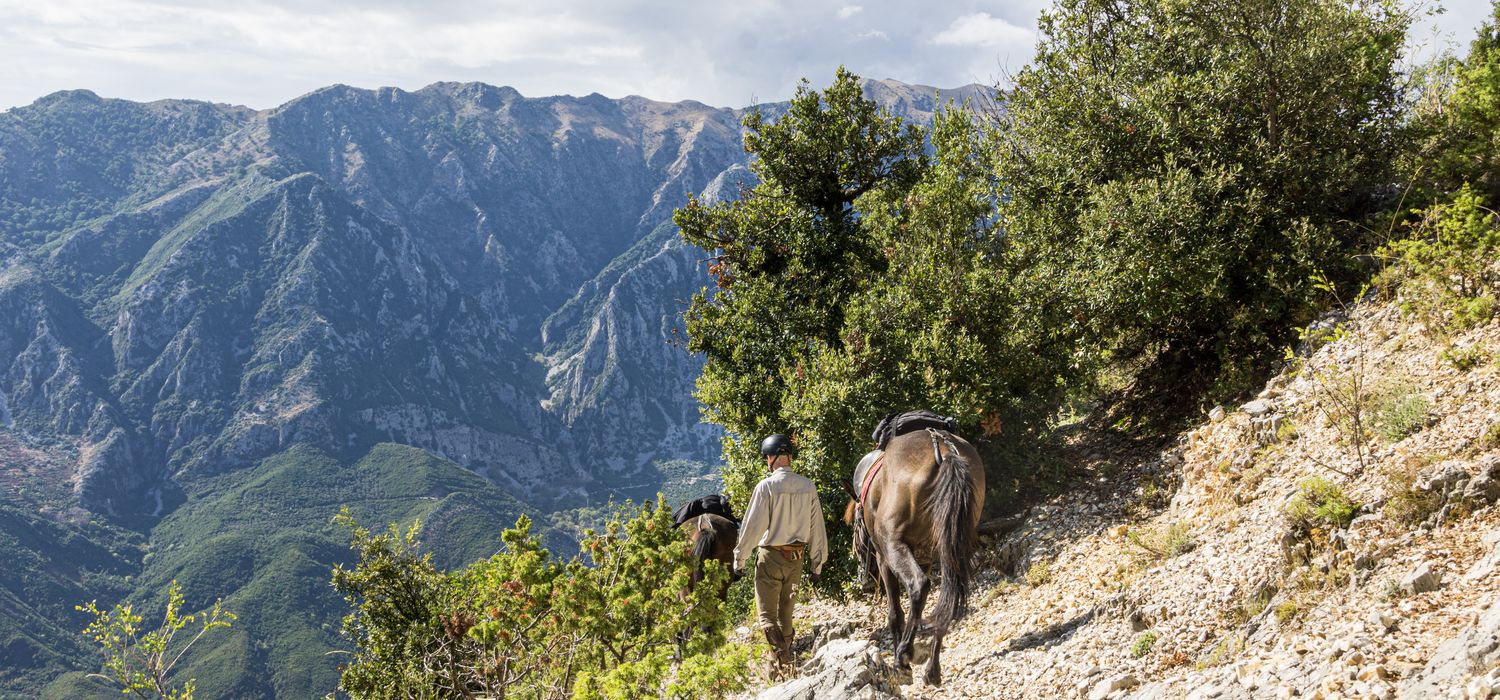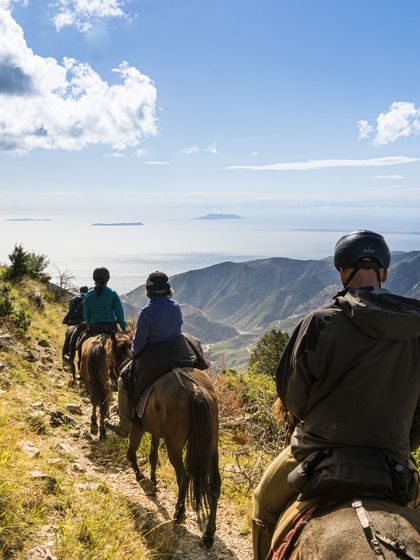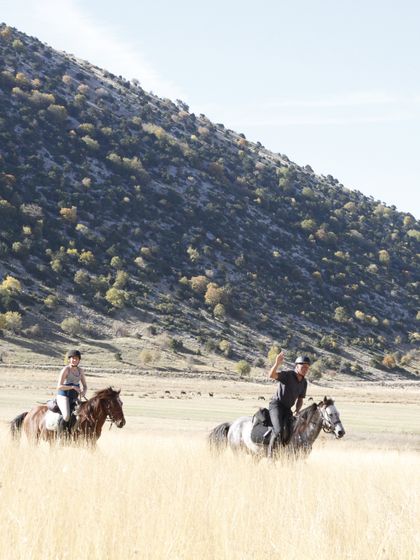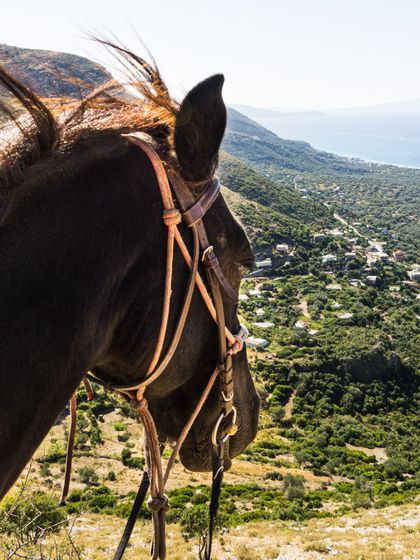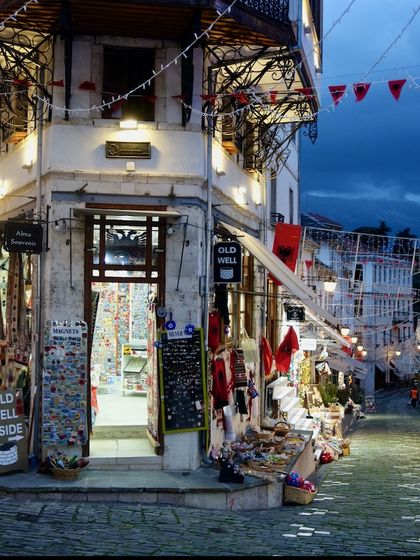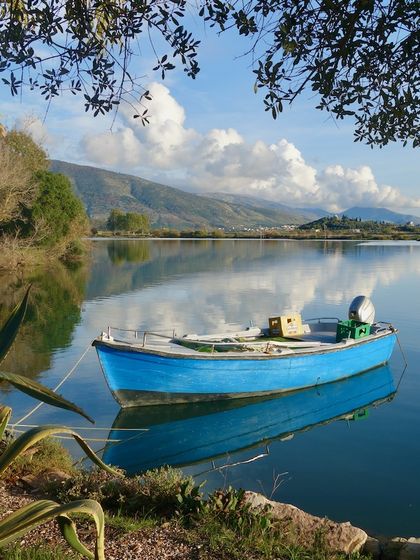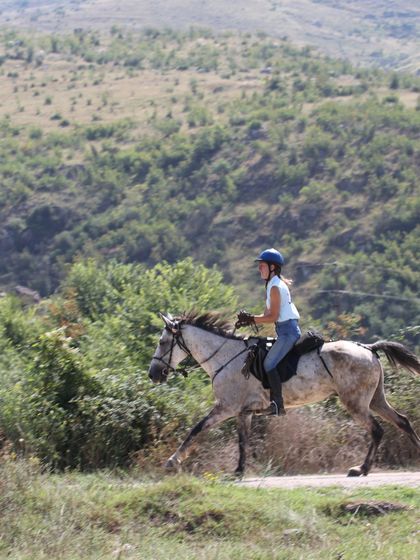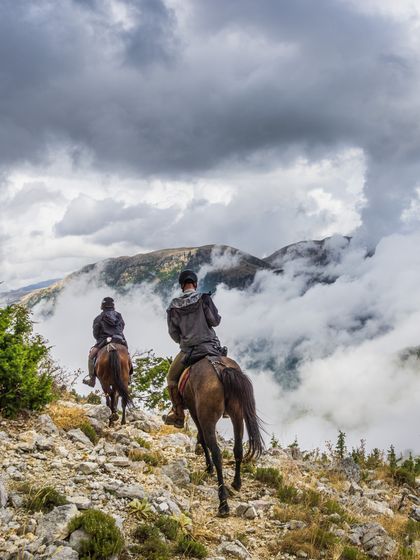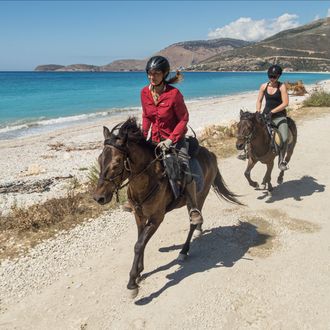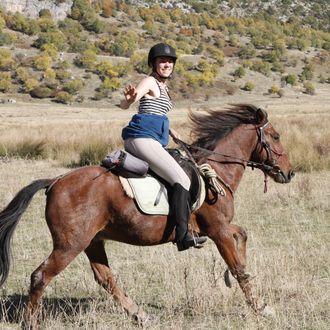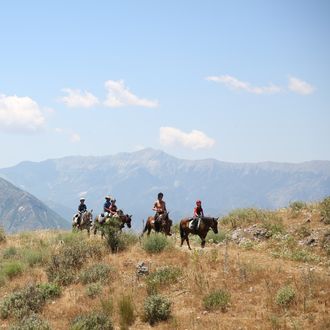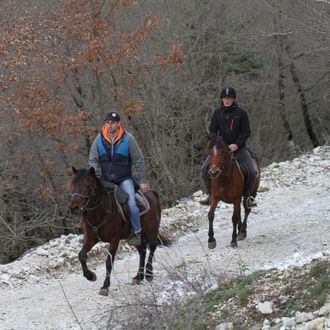Day 1
Riding: No riding.
You should aim to arrive in Albania during the morning (no later than 14:00). A transfer will meet all riders at Tirana airport and take you the 220km to Gjirokaster town, a journey of c. 3 hours. There may be time to settle into your room at the traditional hotel in the historical centre of Gjirokaster before meeting for lunch (to own account; provided you arrive early enough). In the afternoon you will be able to explore the town, perhaps visiting the bazaar, Gjirokaster castle, the church, mosque or Enver Hoxha's house. We would recommend buying a local map as during dinner your hosts will discuss the route with you and you may like to mark where you will be riding.. Dinner will be taken at a traditional restaurant and the guides will be on hand to fully brief you for the week ahead.
Day 2
Riding: 5 - 6 hours
After breakfast you will be driven 15 minutes to the stables to begin your riding adventure. Your ride starts traversing through valleys, allowing for exhilarating canters, before crossing the Drino River. The ride then continues through hilly terrain, small rivers, pine forests, and steep ascents and descents.
You will take a short break at the Cepo Monastery, an important Orthodox site boasting breathtaking views of the Drinos Valley then continue for another 30-minutes before stopping to enjoy lunch at a local farm.
In the afternoon you ride down to the Kardhiq River, where you'll see intriguing natural formations like the 'Gods of the Light' pillar rocks. You also pass through the village of Zhulat.
The day's ride will finish in the village of Fushbardha, a significant hub in the Laberia region. You will spend the evening and night in a village house, enjoying homemade traditional food and beverages. After helping with the horses, you can immerse yourself in the local life by taking a walk, enjoying a beer and perhaps meeting the locals,
Day 3
Riding: 8 - 9 hours
After enjoying a traditional breakfast at the family house, you will prepare for a long day of riding. Today's ride follows the tracks of King Skerdilajd's army, which passed through the 'Neck of the Rock'; around 2,300 years ago. King Skerdilajd played a crucial role in Queen Teuta's plans to create an Adriatic Front against Rome.
The trail takes you through beautiful woods, mountain climbs, rocky landscapes, and ancient ruins. Along the way, you will encounter various landmarks such as the Basha Stones, Dhespina Cave, the Rock of Kaze, The Valley of Cheries, the Crooked Brook, Shameti Brook, Trullas Neck, and Derrasa Hole. These sites offer glimpses into the rich history and ancient civilizations of the region.
For lunch you will enjoy a picnic in a mountain valley surrounded by a small oak forest, which you will pack yourself in the morning. The picturesque landscape and serene atmosphere provide a perfect setting for a relaxing meal. Be prepared for some walking during the day, as you may need to lead the horses for approximately 1 hour and 30 minutes through difficult paths and steep downhill sections. It is advisable to wear good mountain hiking shoes to ensure your comfort and
safety, and to carry at least three bottles of water with you.
By late afternoon, you will arrive at a family house where you will spend the evening and night. The hosts will treat you to homemade traditional food, often prepared with olive oil, which is abundant in the region. You can also enjoy local wine, raki (a traditional Albanian spirit), and mountain tea, which will help you unwind after a long day of riding.
In the evening, you can enjoy the return of the herds (sheep and cows) and if you like you are also welcome to feed or brush the horses before they rest for the night.
Please note: This is a challenging day, and you will have to walk on foot, leading your horse, for c. 1-2 hours. You need to be fit and wear good walking boots.
Day 4
Riding: 3 - 4 hours
After a hearty breakfast with the shepherd's family, you will set out on a shorter relaxing riding day. The first stop is the castle of Borsh, also known as the Castle of Sopot, situated on a hill in Borsh village at an altitude of 500 meters. This ancient castle
dates back to the 4th or 3rd century BC and has witnessed the influence of various civilizations, including the Byzantine Empire and the Republic of Venice.
After exploring the castle ruins, you will ride along the old road that runs parallel to the seaside. Olive trees, citrus fruits, and grapefruits adorn the upper part of the road, while remnants of defense bunkers from the past can be seen along the coastline of Piqeras, an old fishing village.
Your ride finishes for the day in the village, where you will enjoy lunch on the terrace of a local house. For your accommodation tonight, you will stay in a typical coastal house, immersing yourself in the local atmosphere.
After lunch, you will have the opportunity to relax and enjoy a free afternoon by the sea (your hosts will drive you there by car).
In the evening, dinner will be served on the terrace of the guesthouse, where you can enjoy the local atmosphere, music, and fresh fish.
Day 5
Riding: 6 - 7 hours
Start your day with a delightful breakfast on the terrace, overlooking the Ionian Sea. Traditional coastal delicacies such as byrek (cheese pie), cookies, butter, fresh milk, and honey will be served. Today's ride takes you through olive tree terraces, offering magnificent views of the sea. You will ride along the beach of Bunec, a pristine stretch of sand and pebbles, enjoying the refreshing breeze from the sea.
Enjoy a homemade lunch at a small restaurant by the sea then afterwards, take a 2-3 hour break to swim, sunbathe, or enjoy leisurely walks along the beach.
The day's ride continues as you enter a small 'jungle' of trees, bushes, and rocks, riding amongst the remains of an old road that once connected the sea with the villages along the coast. During the afternoons ride, you will pass through the village of Shen Vasil, a medieval center with a dark history during the dictatorship era, as it served as a labor camp for political prisoners. Traces of this tumultuous past can still be seen throughout the village.
You then descend into the Kalasa Valley to reach the battlefield of 229 BC, where you canter along the ancient battlefield of King Skerdilajd. Along the way, you may encounter herds of sheep and goats accompanied by local shepherds. This region has
a strong rural tradition, and you might get a glimpse into the daily lives of the locals. The day will conclude in Bajkaj Village, located 200 meters above the valley and surrounded by citrus groves (oranges, lemons, olives).
In the late afternoon, you will arrive at a local house where you stay the night. The village atmosphere provides a cozy and comfortable setting, allowing you to rest and recharge for the next day's adventures.
Day 6
Riding: 6 - 7 hours
Today begins with the ascent of Mount Sopoti. Initially, you will ride through gentle and picturesque hills towards Varfaj village, where you'll be greeted by breathtaking vistas. As you continue to reach the summit of Mount Sopoti, you will take a break where the horses can enjoy a refreshing drink stop at some natural springs and you can refill your bottles.
After the village of Varaj, the ascent becomes steeper and more rocky, so the ride will be slower until you reach the top of Mount Sopoti. At the summit, enjoy a picnic that you have prepared in the morning.
The descent offers panoramic views of the Drinos Valley, but some sections require dismounting and walking for approximately 15 minutes.
Arriving at Lazarat village, known for its storied past and recent transformations, you will find yourself immersed in its rich culture. Once infamous for marijuana cultivation, Lazarat now proudly showcases its timeless traditions.
Your accommodation for the night is a local village home which offers an authentic experience and the chance to join in a cookery class led by your hosts. Amidst the serene ambiance of the olive groves, dinner becomes an unforgettable feast, a perfect setting for a wonderful evening feast.
Day 7
Riding: 3 hours
Your final day's ride is shorter and you start by riding through Lazarat village en route to Drinos Valley. The path will lead you to a suitable crossing over the Drino River, where you can enjoy numerous exhilarating canters.
As you approach the southern outskirts of “Asim Zeneli” village, you ascend the hills, eventually arriving at the stables. Here, you will untack and wash off the horses before they roam freely and unwind after your week long ride.
After bidding farewell to the horses, you will enjoy a picnic lunch thoughtfully prepared by a local family in Asim Zeneli and you can also enjoy a refreshing drink at the village café.
This evening, we will enjoy a farewell dinner.
Day 8
Riding: No riding.
After breakfast you are transferred back to the airport for your flight home.
Note: All programmes and itineraries are weather dependent; in the face of adverse, or unexpected, weather conditions reasonable attempts will be made to provide equivalent riding. All programmes are accurate at the time of writing. However, the team may adapt or modify details, whilst aiming to provide a similar experience.
